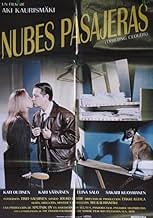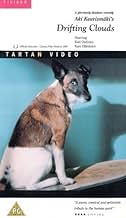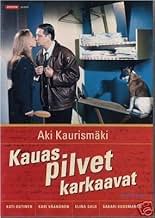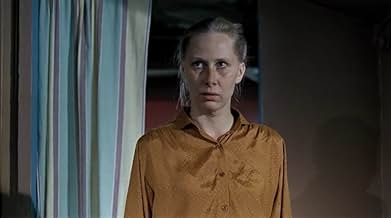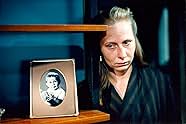NOTE IMDb
7,6/10
10 k
MA NOTE
La récession frappe un couple à Helsinki.La récession frappe un couple à Helsinki.La récession frappe un couple à Helsinki.
- Récompenses
- 10 victoires et 2 nominations au total
Matti Pellonpää
- Child in the Photo
- (images d'archives)
Avis à la une
I particularly liked Man Without A Past, by the same director, and this is much in the same vein. A couple having financial difficulties tries to make their way. Sounds like all of us. Only this couple delivers delicious witty dialogue in a deadpan style that cracks me up every time. Even their fights and make ups are so understated that it's a style all it's own. Don't look for the obvious here, it's hidden under a layer of Finnish humor so opaque that you have to watch very closely to see even a glimmer of laughter in anyone's eye.
The film is gloomy, depressing, bleak, but somehow it does your heart good. Even when things seem to be at their worst, you can't help but feel that the hardworking and honest couple will manage to somehow get back on solid ground and right with the world. You want them to. You need them to. They simply must, or your poor little heart will break.
It's hard to describe this film because nothing much seems to happen, there are only the normal setbacks of life in the low income zone, but by the end you realize that you've seen a great movie and are happy with it. What helps keep you interested are the dialogue and the understated style. For example, why do all the men wear their hair the same way? Does anyone own clothes that aren't drab? Why does all the furniture look like it's from the 1950's? All these questions and more will occur to you while watching the film and wondering if anyone will ever crack a smile.
The film is gloomy, depressing, bleak, but somehow it does your heart good. Even when things seem to be at their worst, you can't help but feel that the hardworking and honest couple will manage to somehow get back on solid ground and right with the world. You want them to. You need them to. They simply must, or your poor little heart will break.
It's hard to describe this film because nothing much seems to happen, there are only the normal setbacks of life in the low income zone, but by the end you realize that you've seen a great movie and are happy with it. What helps keep you interested are the dialogue and the understated style. For example, why do all the men wear their hair the same way? Does anyone own clothes that aren't drab? Why does all the furniture look like it's from the 1950's? All these questions and more will occur to you while watching the film and wondering if anyone will ever crack a smile.
Let Americans be Americans. Let them have their explosions, action, mainstream movie-making. Kaurismäki's film "Kauas pilvet karkaavat" is a slight parody, of course, but it contains a little Finland in it. Feelings are irrelevant, we Finns are more like Borg than "civilized" people, who can discuss about weather in every possible situation. I think everyone who comes to Finland, should see this film. It helps to understand.
To truly understand and appreciate Kauas pilvet karkaavat (Drifting Clouds)you need to understand something of the Finnish mindset, and to understand something of the Finns I would recommend this film. Kaurismaki is able to encapsulate and embody the Finns and Finland in his work. I have lived 10 months of my life in Finland, and I was therefore able to identify immediately with this film through my experiences of Finland and the Finns themselves (my dear friends there). This film captures the sense of space that Finland itself has, the sense of space that the Finns create around themselves (Finns appear to me to be somewhat unseasy with urban and city living, hence everyone's desire to escape to a kesamokki, summer cottages at the earliest possible time) and the understated, no-BS nature of the Finns themselves, it is the only country I know where it is truly possible to have confortable silences when conversing with people.
Silent despair, brought on by the extremes of the climate, Finland's relative isolation, the social problems that DO exist there (despite being a Scandinavian country with all the images of a freedom and social support that that may conjure), the expectation of conformity that exists within such small societies, and yet the strong innate desire of every Finn to truly assert an individual identity over within the framework of this 'organised freedom' are all apparent in this film and are how I observed Finland. The 'national' sport of drinking until one passes out, particularly during the dark days of winter, and when coping with depression or despair. To any Finns out there, this is not meant to cause offense, my apologies if these comments do.
Kaurismaki's use of long shots and one takes for a sequence of action (or non-action), and the sense of time and anticipation that they create, until you realise that the anticiption amounts to nothing, which is so in line with the Finnish sense of humour. It is always difficult to generalise about a particular nation and make sweeping statements that are meant to be applicable to all who live within the confines of those national boundaries. But as a small country (in terms of population) with a closely homogenous people, these traits are quite discernable, especially with the impact that the environment and climate brings...Drifting Clouds and the Leningrad Cowboys are two sides of the same coin...
I make this disclaimer, the film is actually gloomier than life there.
Silent despair, brought on by the extremes of the climate, Finland's relative isolation, the social problems that DO exist there (despite being a Scandinavian country with all the images of a freedom and social support that that may conjure), the expectation of conformity that exists within such small societies, and yet the strong innate desire of every Finn to truly assert an individual identity over within the framework of this 'organised freedom' are all apparent in this film and are how I observed Finland. The 'national' sport of drinking until one passes out, particularly during the dark days of winter, and when coping with depression or despair. To any Finns out there, this is not meant to cause offense, my apologies if these comments do.
Kaurismaki's use of long shots and one takes for a sequence of action (or non-action), and the sense of time and anticipation that they create, until you realise that the anticiption amounts to nothing, which is so in line with the Finnish sense of humour. It is always difficult to generalise about a particular nation and make sweeping statements that are meant to be applicable to all who live within the confines of those national boundaries. But as a small country (in terms of population) with a closely homogenous people, these traits are quite discernable, especially with the impact that the environment and climate brings...Drifting Clouds and the Leningrad Cowboys are two sides of the same coin...
I make this disclaimer, the film is actually gloomier than life there.
Aside from Leningrad Cowboys Meet Moses, Aki Kaurismäki has never done any real sequels to his films (even though Shadows in Paradise featured one of the minor characters from Crime and Punishment). Drifting Clouds, the first entry in the acclaimed "losers" trilogy, was meant to be an exception, the script having been written specifically as a follow-up to Shadows. Sadly, Matti Pellonpää, who was eager to reprise his role as Nikander, died shortly before filming began, thus abruptly ending a working relationship with the director which had lasted 11 years and 8 movies (The Match Factory Girl and I Hired a Contract Killer were the only ones in which he did not appear prior to his death), prompting Kaurismäki to change the screenplay.
Nonetheless, there are still traces of the original project in the finished film, namely the characters played by Kati Outinen (who became the new protagonist of the story) and Sakari Kuosmanen, who retain the names they had in Shadows: Ilona and Melartin. They both work at a restaurant called Dubrovnik (as maitre d' and waiter respectively), under the supervision of Mrs. Sjöholm (Elina Salo). There are no major problems in the workplace, the only occasional disturbance being the alcohol-induced antics of the cook Lajunen (Markku Peltola, who later played the lead in the trilogy's second act, The Man Without a Past). Then one day Mrs. Sjöholm announces the restaurant is being handed over to a new proprietor, meaning the old staff's services are no longer required. Everyone faces unemployment their own way: Lajunen buries himself in booze ("Where are you going?" he gets asked one evening; "As far as the Kossu lasts" he replies, referring to Finland's most popular drink) and Melartin starts looking for another job, while Ilona is confident her husband's income will be enough for the two to lead a decent life. Unfortunately, Lauri (Kari Väänänen) loses his job as well, causing despair and frustration as his wife tries to come up with a solution that could satisfy everybody.
As usual, Kaurismäki depicts contemporary Finnish society with a very pessimistic eye, never once flinching away from the sadness of the situation. The high point of this is reached in Esko Nikkari's cameo, a scene drenched in cynicism and cruelly black humor where the great character actor tells Outinen (always at her best in these pictures) that once you're past the age of 30, you're completely worthless in the business world. "You're 56" she reminds him; "Yes, but I have connections" comes the painfully dry answer. It's a dramatic sequence which reflects what really goes on in the world every day, albeit filtered through Kaurismäki's peculiar view on life.
And yet, for all the misery that permeates the picture, Drifting Clouds is actually the most optimistic of the "losers" films: perhaps remembering what the movie was originally meant to be, the director fills almost every frame (minus the Nikkari scene) with gags, in order to lighten the mood. And the conclusion stands out as one of the most cheerful Kaurismäki has ever shot, maybe because that is the kind of ending in which Pellonpää, to whom the film is dedicated, would have given another of his understated, hugely affecting, unforgettable performances.
Nonetheless, there are still traces of the original project in the finished film, namely the characters played by Kati Outinen (who became the new protagonist of the story) and Sakari Kuosmanen, who retain the names they had in Shadows: Ilona and Melartin. They both work at a restaurant called Dubrovnik (as maitre d' and waiter respectively), under the supervision of Mrs. Sjöholm (Elina Salo). There are no major problems in the workplace, the only occasional disturbance being the alcohol-induced antics of the cook Lajunen (Markku Peltola, who later played the lead in the trilogy's second act, The Man Without a Past). Then one day Mrs. Sjöholm announces the restaurant is being handed over to a new proprietor, meaning the old staff's services are no longer required. Everyone faces unemployment their own way: Lajunen buries himself in booze ("Where are you going?" he gets asked one evening; "As far as the Kossu lasts" he replies, referring to Finland's most popular drink) and Melartin starts looking for another job, while Ilona is confident her husband's income will be enough for the two to lead a decent life. Unfortunately, Lauri (Kari Väänänen) loses his job as well, causing despair and frustration as his wife tries to come up with a solution that could satisfy everybody.
As usual, Kaurismäki depicts contemporary Finnish society with a very pessimistic eye, never once flinching away from the sadness of the situation. The high point of this is reached in Esko Nikkari's cameo, a scene drenched in cynicism and cruelly black humor where the great character actor tells Outinen (always at her best in these pictures) that once you're past the age of 30, you're completely worthless in the business world. "You're 56" she reminds him; "Yes, but I have connections" comes the painfully dry answer. It's a dramatic sequence which reflects what really goes on in the world every day, albeit filtered through Kaurismäki's peculiar view on life.
And yet, for all the misery that permeates the picture, Drifting Clouds is actually the most optimistic of the "losers" films: perhaps remembering what the movie was originally meant to be, the director fills almost every frame (minus the Nikkari scene) with gags, in order to lighten the mood. And the conclusion stands out as one of the most cheerful Kaurismäki has ever shot, maybe because that is the kind of ending in which Pellonpää, to whom the film is dedicated, would have given another of his understated, hugely affecting, unforgettable performances.
10unkka
Celebration for unacting! If you like movies where less is saying more - this is your movie. The wonderful positive attitude of people in difficult situations is something to learn from. Kati Outinen is great - again. She suits this movie perfectly. Kari Väänänen as her husband is the perfect Finnish hard working man whose life isn't a struggle but an art-form it self. Also Markku Peltola as a cook gives once again a memorable performance. The music moves the scenes into another level. Finnish melancholic tango in this environment makes almost a conflict between the things happening in the screen and the music. What a wonderful tribute to Matti Pellonpää.
Le saviez-vous
- AnecdotesDedicated to the memory of Matti Pellonpää (who was frequently cast by director Aki Kaurismäki) for whom the main role was originally intended. The child who can be seen in the photo is Pellonpää, a homage.
- Citations
Restaurant chief: [Ilona is applying a new job] To be honest, you're beginning to be too old.
Ilona: I'm 38.
Restaurant chief: You can pass away at any time.
- Crédits fousClosing credits begin with dedication to the late actor (and frequent collaborator) Matti Pellonpää: "Omistettu Matti Pellonpään muistolle."
- ConnexionsEdited into Välittäjä (1996)
- Bandes originalesPathetique
Composed by Pyotr Ilyich Tchaikovsky (as Pjotr Tshaikovski)
Meilleurs choix
Connectez-vous pour évaluer et suivre la liste de favoris afin de recevoir des recommandations personnalisées
- How long is Drifting Clouds?Alimenté par Alexa
Détails
- Date de sortie
- Pays d’origine
- Site officiel
- Langues
- Aussi connu sous le nom de
- Drifting Clouds
- Lieux de tournage
- Sociétés de production
- Voir plus de crédits d'entreprise sur IMDbPro
Box-office
- Budget
- 5 562 154 FIM (estimé)
- Durée1 heure 35 minutes
- Mixage
- Rapport de forme
- 1.85 : 1
Contribuer à cette page
Suggérer une modification ou ajouter du contenu manquant

Lacune principale
By what name was Au loin s'en vont les nuages (1996) officially released in India in English?
Répondre
